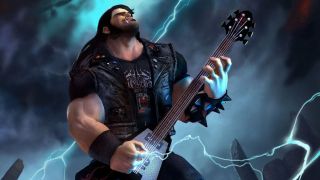If you didn't know any better, you'd be forgiven for assuming Tim Schafer was just another Brutal Legend superfan. As the Double Fine CEO excitedly gives me a digital tour of his San Francisco office, showing off signed Judas Priest vinyls, hand-painted Eddie Riggs statues, and a life size model of the game's "Love Giver" guitar, Schafer's passion for Brutal Legend is palpable, even decades on from when he first considered pushing the longboat of high fantasy into the straits of heavy metal for a different kind of RTS game.
"Brutal Legend was a very sincere game in the best possible way,'' explains Schafer, looking back on the title with GamesRadar+ for its tenth anniversary. "That was our last major 'all hands on deck' game, where everyone was working on the same project. We were using our own game engine, partnered with major publishers, and had so many different features to work on… It's kind of remarkable how much the company has changed since then."
For recent converts to the wonderful world of Double Fine (the studio had a major presence at the Xbox E3 2019 press briefing after being acquired by Microsoft earlier this year), Brutal Legend saw the developer lean as close as it ever has into the triple-A space. The game had an all star cast, fronted by Jack Black, major publisher backing in the form of Electronic Arts, and one of the strongest marketing campaigns of that year - including efforts to set a new Guinness World Record for the largest number of air guitar players performing at one time.
Symphony of destruction
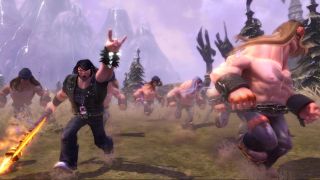
For a variety of reasons, Double Fine has maintained a decidedly indie focus ever since and, listening to Schafer's recollections of Brutal Legend's turbulent development, you can understand why. The project had originally struck a publishing deal with Vivendi early on, but in 2008 the company's game division was acquired by Activision Blizzard. Without warning, Double Fine's new publishing partner then decided to drop Brutal Legend from its portfolio, despite the years of development time and effort that had already gone into making the title.
"That day was one of the only times I actually said 'I need to go across the street and get a drink right now!'", admits Schafer. "It was very traumatic, and hadn't been handled in the best way either. When Vivendi merged with Activision, all of the great people that we had been working with and had originally greenlit our game were gone, replaced by some new people who were like 'Who are you guys?'. Then they disappeared, and there were lawyers involved, and it really got ugly. That whole series of events was one of the main inspirations for wanting to be independent later; I didn't want to take any of the team through that ever again."
Luckily, Brutal Legend got picked up by Electronic Arts at the tail end of 2008, and Schafer is quick to point this out as a silver lining of the Activision fallout, given some of the major advantages of working with the publisher behind some of the biggest properties in the world. For one thing, Double Fine was able to make use of EA's full-time licensing team to pile together its ambitious soundtrack of heavy metal earworms, as Schafer explains. "It was an incredible undertaking. We featured 107 bands on the soundtrack, and still have all the contracts right here in the office. Sometimes I look through them and am amazed at seeing the signatures of Motley Crue and Tommy Lee on the same page as the Double Fine logo!"
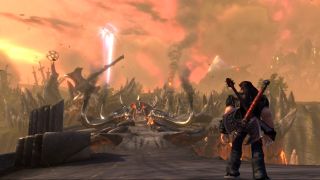
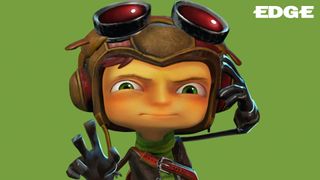
Hands-on with Psychonauts 2: A sequel that delights in the chaos of its mind-bending mischief
Of course, it wasn't just licensed songs that gave Brutal Legend its authority amongst the metalhead crowd. In addition to Jack Black, the campaign featured the voices and likenesses of Ozzy Osbourne, Lemmy Kilmister, Rob Halford, and Lita Ford, all of whom came to the studio to record lines for their in-game counterparts. For Schafer, himself a longtime headbanger, getting to work alongside these icons of the music industry was nothing less than a dream come true.
"There's this image of rockstars as rebellious and difficult to work with, but as soon as they recognise you as a creative person, it's like you're just putting on a show together. They're such talented people who really think about how to create an image and a character and how to fit their music into that character, and so growing up loving Judas Priest and Rob Halford... the fact that we got them in the game was incredible."
"I remember waiting in the studio one day for Rob Halford, and I get this phone call from an unrecognised number on my phone. Turns out it was Rob on the other line, saying he's going to be ten minutes late and profusely apologize for it in this polite, gentlemanly manner. It was surreal! These guys don't have the long and esteemed career they've had without being genuinely nice and professional people."
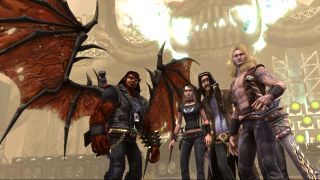
Of course, we can't talk about Brutal Legend without talking about Jack. It's no secret that the game's protagonist, Eddie Riggs, was inspired by the all-dancing, always singing musician turned actor-comedian (and, more recently, successful YouTube personality), so when Schafer met with Black to see if he'd be interested in the part, excitement was high.
"The way Jack approaches Tenacious D, where it's like they're not taking it too seriously, except they're taking it really fucking seriously… that's the kind of balance between comedy and drama that we wanted for Brutal Legend. So I was excited about talking to him, and then as soon as we showed him the concept art and got talking about the character, he was in from the get go. Once we had Jack, it just gave us the legitimacy to do everything else."
Back in Black
Brutal Legend launched to largely positive reviews from the press and players alike, and remains Double Fine's best-selling game to date, but - despite the warm response - EA canned development of a sequel well into its pre-production stage at Double Fine in 2010, at which point the studio split off its workflow into development of four separate indie projects.
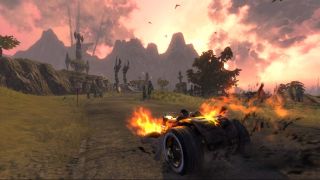
"I'm not that interested in doing a sequel to anything after Psychonauts 2"
Tim Schafer
"That's what you would call a pivot!" jokes Schafer. "When EA cancelled Brutal Legend 2, we didn't have anything else in the works, or any money or contacts to ensure this new income, so it was scary for sure. But we had all these demos from these game jams we'd done, and we took them on the road and got all four of them signed and that's really what saved the company, to tell the truth. Just doing those 4 games at once felt so much more stable, because if any shenanigans happens with one publisher, we would still have three sources of revenue. So it just stabilised the company a lot and let us become truly independent."
Schafer has repeatedly expressed interest in a Brutal Legend sequel ever since the original project was cancelled all those years ago, but has often pointed to money and the associated risks of working in the triple-A space as reasons holding the studio back from returning to the Age of Metal. The developer is busy working on another sequel at the moment with Psychonauts 2, but now that it has the financial and political might of Microsoft behind it as a first party Xbox studio, is Brutal Legend 2 looking more likely than ever? Schafer's answer might not be what fans are hoping to hear.
"I've gotta tell you right now; I'm not that interested in doing a sequel to anything after Psychonauts 2", he tells me. "Psychonauts 2 is a sequel and we always like to do the opposite of whatever we did last. Even before Psychonauts 2, we did a lot of the remasters of LucasArts games which were kind of looking back fondly, and even Broken Age was looking back on our genre, so I'd love to do something more forward looking after this."

Even so, Schafer still admits Brutal Legend 2 is more technically possible than ever now that Double Fine has a stable and healthy partnership with Microsoft, and the fondness he still has for that world and story means it's almost inevitable that the studio will return to it one day.
"Everyone put their heart and soul into that game,'' concludes Schafer, as our conversation draws to an end before he dives back into Psychonauts 2. "It wasn't like we were putting anything on; I genuinely love heavy metal, and I really love all the images in that game that came from me and [Art Director] Lee Petty. I think we really pushed ourselves on Brutal Legend and I have so much pride for what we accomplished."
As for what Schafer is doing on Brutal Legend's birthday, Rocktober 13 itself… well, he'll tell you there's only one correct answer, especially as the game is now backwards compatible on Xbox One: "I still play it every year!".
For more, check out the best new games of 2019 and beyond on the way, or watch the video below for our latest episode of Dialogue Options.
